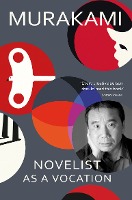Words have power. Yet that power must be rooted in truth and justice. Words must never stand apart from those principles.
'You end this collection...vowing to never let life, or writing, get so complicated again' Guardian
Readers who have long wondered where the mysterious novelist gets his ideas and what inspires his beautifully surreal worlds will be fascinated by this highly personal look at the craft of writing.
In this engaging book, the internationally best-selling author shares with readers what he thinks about being a novelist; his own origins as a writer; and his musings on the sparks of creativity that inspire other writers, artists, and musicians.
'Murakami is like a magician who explains what he's doing as he performs the trick and still makes you believe he has supernatural powers' New York Times Book Review
'A fascinating glimpse of the peculiar writerly life' Sunday Times
** A TIMES, SUNDAY TIMES and NEW STATESMAN BOOK OF THE YEAR**


